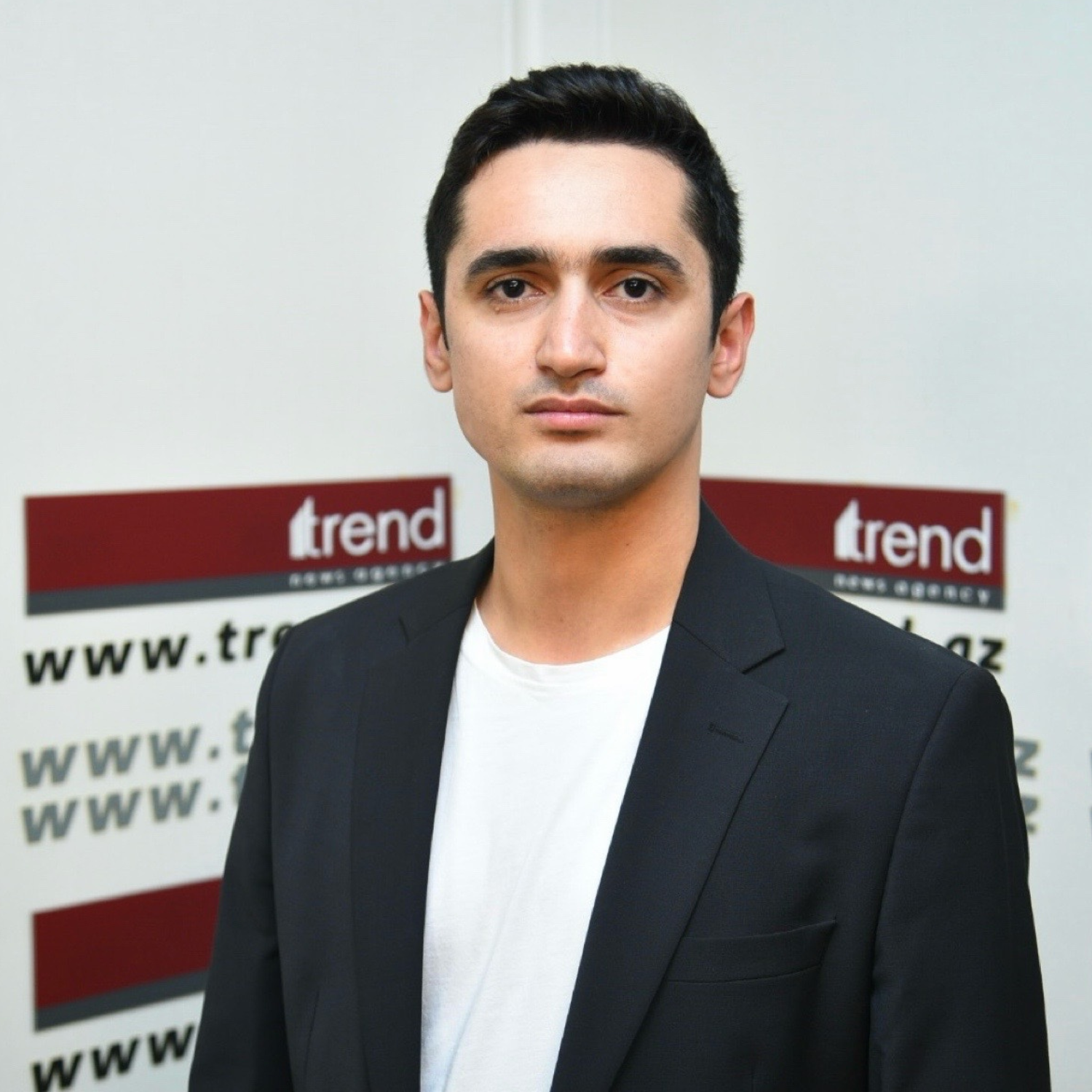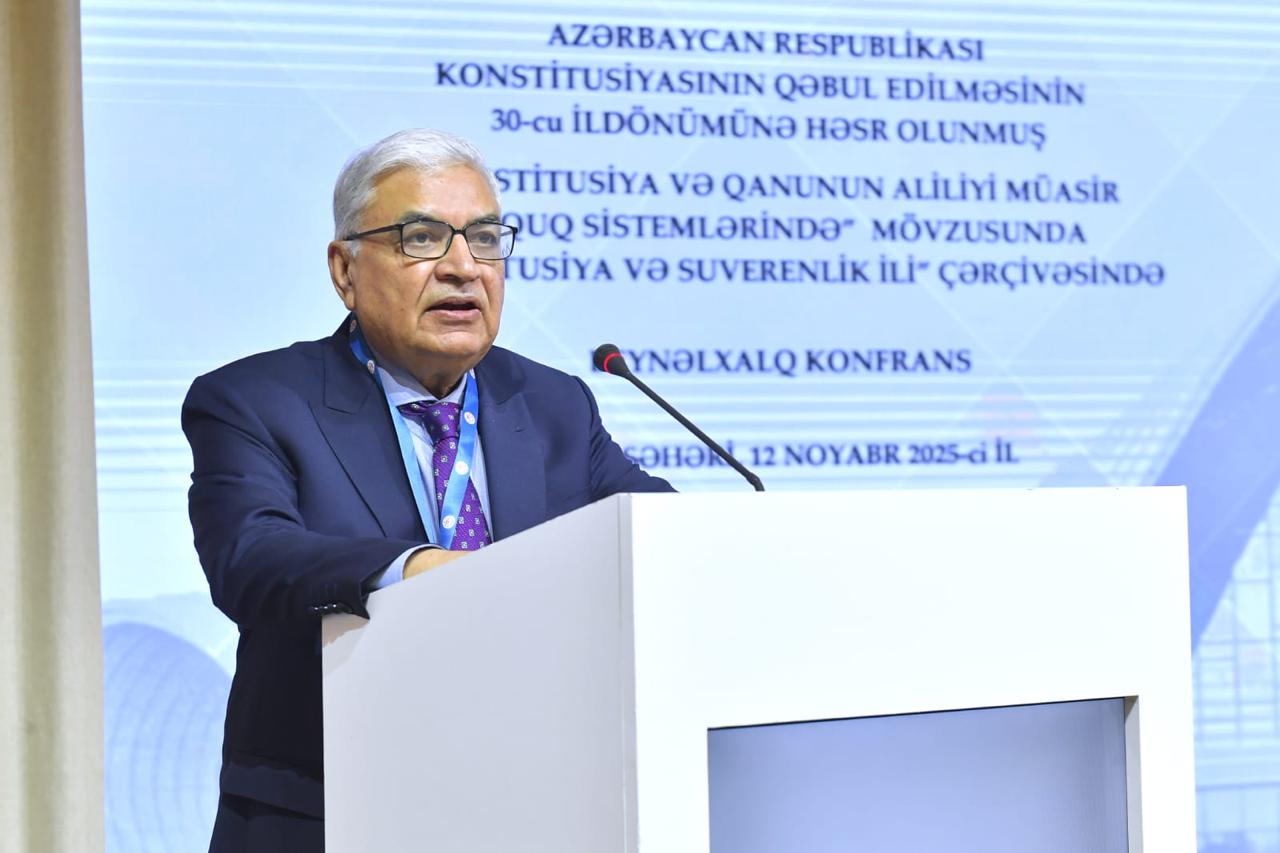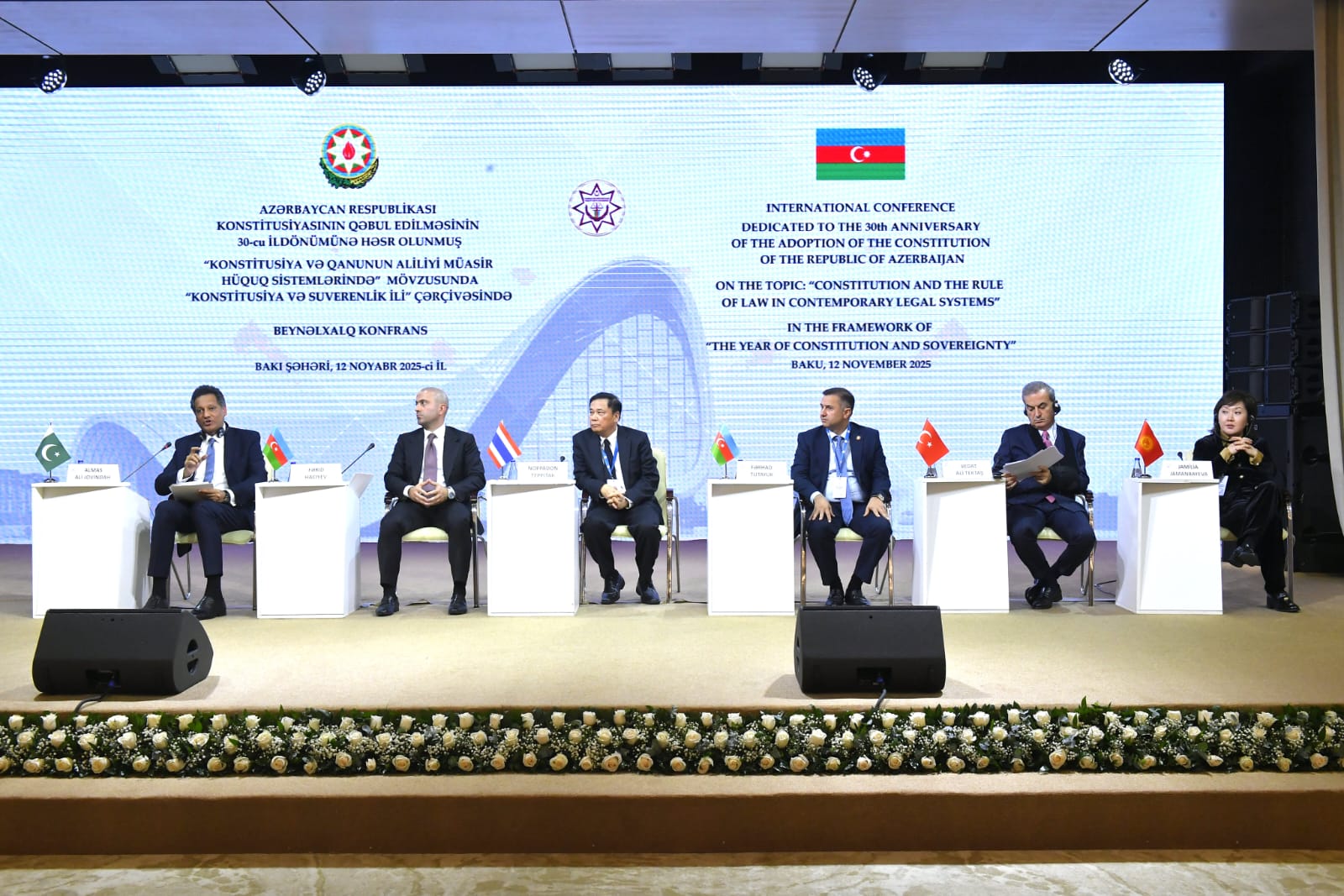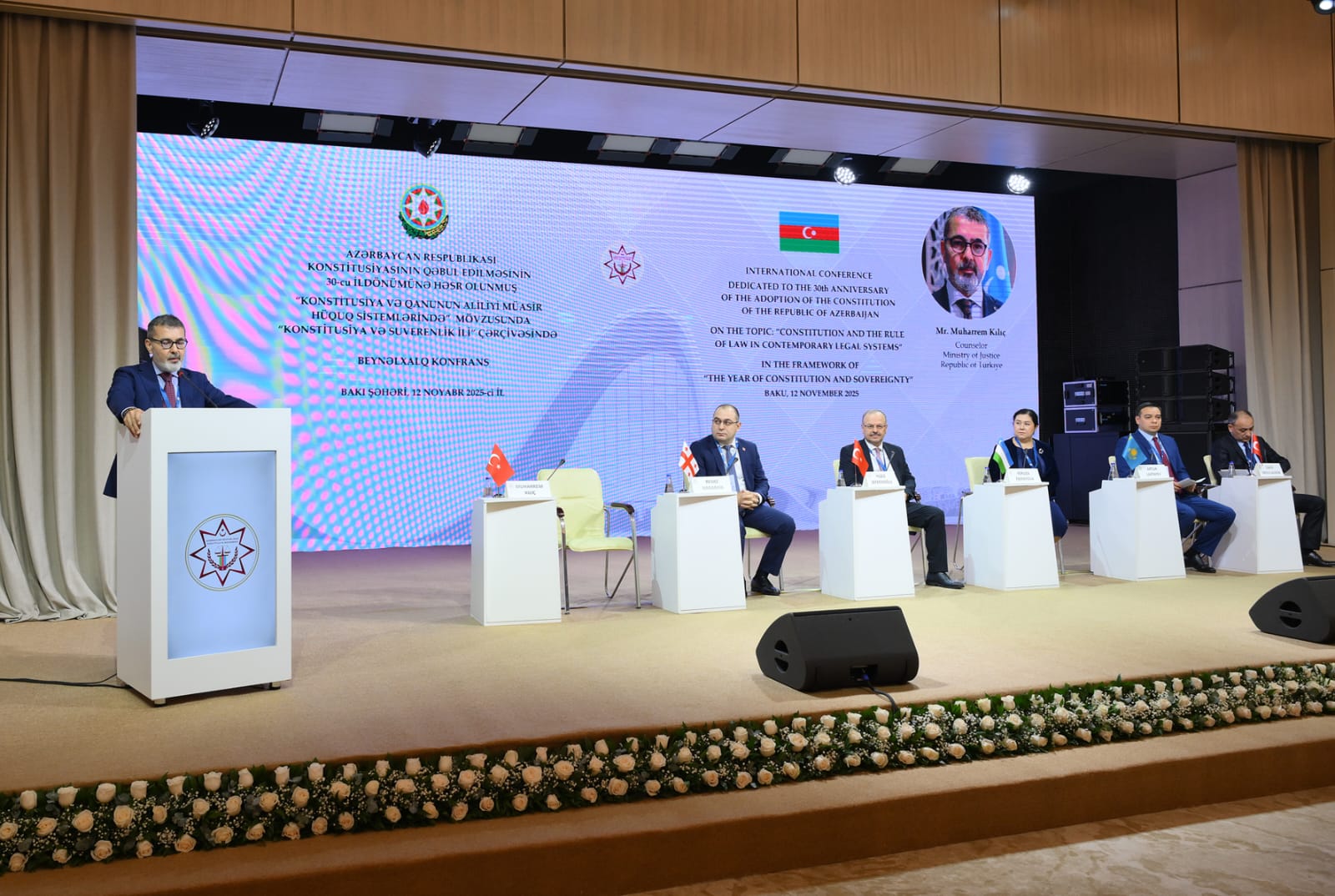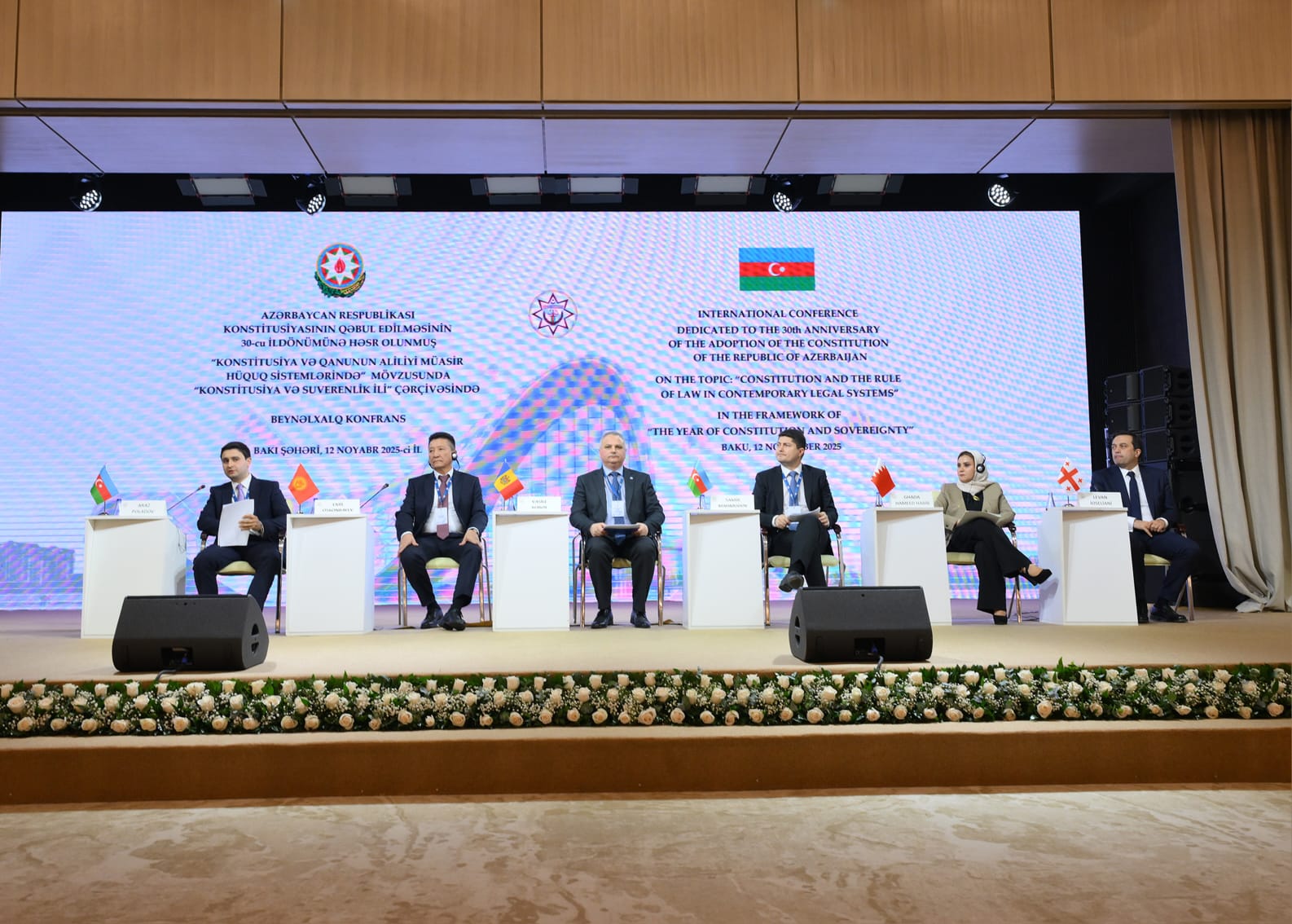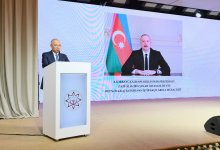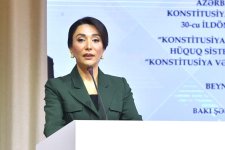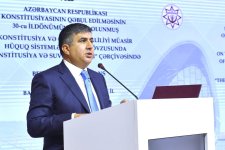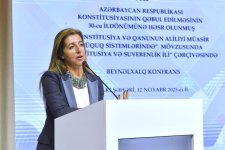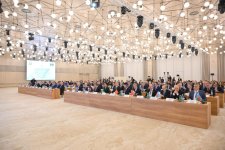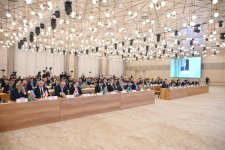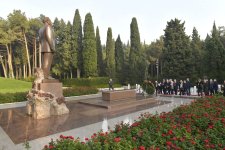BAKU, Azerbaijan, November 12. An international conference titled “Constitution and the Rule of Law in Modern Legal Systems” was held at the Gulustan Palace on November 12, with the support of the Presidential Administration of the Republic of Azerbaijan and the organization of the Constitutional Court of Azerbaijan, marking the 30th anniversary of the adoption of the Constitution, Trend reports.
Before the event, participants visited the Alley of Honor to pay tribute to National Leader Heydar Aliyev and laid flowers at the monument in the Victory Park. A commemorative video dedicated to the Constitution’s anniversary was presented at the opening ceremony.
Chairman of the Constitutional Court, Farhad Abdullayev, delivered President Ilham Aliyev’s address to participants, expressing gratitude on behalf of attendees for the head of state’s thoughtful message. Welcoming international guests along with officials from government institutions and public organizations, the chairman congratulated attendees on Constitution Day, marking three decades since the adoption of Azerbaijan’s Basic Law (Constitution).
Abdullayev emphasized that the declaration of 2025 as the “Year of Constitution and Sovereignty” on December 28, 2024, underscores the supreme value of the Constitution as the foundation of Azerbaijan’s statehood.
He noted that the Constitution, as the cornerstone of the legislative system and guarantor of national unity, ensures social and political stability in the country.
Abdullayev highlighted that one of the most significant contributions of National Leader Heydar Aliyev, a figure of exceptional importance in Azerbaijan’s statehood, was overseeing the adoption of the country’s Basic Law. Under his leadership, the draft of the first Constitution of independent Azerbaijan was prepared and approved through a nationwide referendum in 1995, marking a pivotal moment in the nation’s democratic and secular state-building.
He emphasized that over the past three decades, the Constitution has evolved into the country’s foundational legal framework, defining the system of governance, guiding political strategy, and safeguarding citizens’ rights and freedoms. The principles enshrined in the document, he said, represent a seamless link between Azerbaijan’s past and its future.
“The Constitution we celebrate today is our collective treasure. Time passes, generations change, but the Constitution remains supreme and resilient,” Abdullayev said, highlighting the duty to develop laws in line with new challenges while upholding core constitutional values.
He noted that while the 1995 Constitution laid the legal foundation for Azerbaijan’s independence, the Victory achieved in 2020 under the leadership of President and Supreme Commander-in-Chief Ilham Aliyev solidified its supreme authority across the nation’s entire territory. With that victory, the principle enshrined in Article Eleven of the Constitution, declaring the territory of the Republic of Azerbaijan unitary, inviolable, and indivisible, became a living reality, reaffirming the supremacy of international law and fundamental principles.
Abdullayev emphasized that the thirtieth anniversary of the Constitution and the fifth anniversary of the nation’s victory are more than symbolic milestones; they represent a call to responsibility, a reminder to safeguard the values of the Basic Law and pass them on to future generations. He added that this year, Azerbaijan established the “30th Anniversary of the Constitution of the Republic of Azerbaijan (1995–2025)” medal, symbolizing the state’s enduring commitment to constitutional principles and its achievements as an independent nation.
The Constitutional Court will continue to fulfill its responsibilities in this regard, Abdullayev said, by ensuring that the development of national legislation aligns with both the letter and the spirit of the Constitution, in keeping with the realities of modern social and political life.
He added that the event would feature “engaging and meaningful discussions” on the country’s legal evolution.
The Human Rights Commissioner (Ombudsperson) of Azerbaijan, Sabina Aliyeva, underlined that the rule of law is not only the basis for fair and sustainable development but also the key guarantor of human rights and freedoms. She noted that constitutional reforms and legal advancements initiated by President Ilham Aliyev have strengthened democratic governance and enhanced human rights protections, making Azerbaijan a reliable international partner.
Chairman of the Asian Ombudsman Association and Federal Ombudsman of Pakistan, Ejaz Ahmad Qureshi, recalled that Pakistan was among the first countries to recognize Azerbaijan’s independence in 1991, stressing the brotherly ties between the two nations.
“Diplomatic ties between the two countries were established in 1992, laying the foundation for a partnership built on brotherhood and mutual respect. Today, relations between Azerbaijan and Pakistan continue to deepen, strengthened by the humanitarian support, attention, and care extended by Azerbaijan’s First Lady, Mehriban Aliyeva,” he said.
He highlighted that the Constitution prepared under Heydar Aliyev’s leadership embodies sovereignty, equality, and justice, serving as the foundation for democratic progress.
“The creation of human rights ombudsman institutions is crucial for safeguarding citizens’ rights and freedoms,” he said.
Ejaz Ahmad Qureshi concluded by congratulating the people of Azerbaijan on the anniversaries of the nation’s Victory in the Patriotic War and the adoption of its Constitution.
President of the European Law Institute (ELI), Teresa Rodriguez de las Heras Ballell, addressed the importance of preparing legal systems for the rise of human–artificial intelligence hybrid societies, noting that future frameworks must balance innovation with democracy, rule of law, and human rights.
“How can we adapt our legal systems to the challenges of hybrid societies and economies?” she asked. At the constitutional level, she said, governments must enable broader use of artificial intelligence (AI) while safeguarding human rights and civil liberties. AI introduces new risks,” she noted.
She emphasized the need for updated legal frameworks that ensure accountability and keep future hybrid societies rooted in democracy, the rule of law, and human rights.
Head of the Department of Legislation and Legal Policy of the Presidential Administration, Gunduz Karimov, emphasized that the Constitution was adopted during a period of hardship, reflecting national values and universal principles. He added that Azerbaijan’s constitutional provisions, once limited by occupation, have been fully restored following the country’s victory and territorial reintegration.
“The Constitution of the Republic of Azerbaijan, drafted under the leadership of National Leader Heydar Aliyev, was adopted during a challenging and decisive period as the nation fought for its independence. Despite those hardships, he noted, the Constitution enshrines national values and principles of statehood while reflecting Azerbaijan’s commitment to universal ideals of peace and coexistence.
“For years, the occupation of Karabakh has limited the full implementation of some constitutional provisions. But under President Ilham Aliyev’s leadership and through the heroism of our Army, those provisions have been fully restored. The Azerbaijani flag now flies over liberated lands, and our borders are secure, giving new life to our Constitution,” Karimov noted.
The conference proceeded with a panel session titled “Constitutional Values and Human Rights: Global Trends and Challenges,” moderated by Prof. Dr. Muharrem Kılıç. The session featured remarks from Revaz Nadaraia, Chairman of the Constitutional Court of Georgia; Javid Abdullazadeh, Professor at Ankara University; Yıldız Seferinoğlu, Justice of the Constitutional Court of Türkiye; Feruza Eshmatova, Commissioner for Human Rights of the Supreme Assembly of Uzbekistan; and Artur Lastayev, Commissioner for Human Rights of Kazakhstan.
The second panel, titled "Constitutional Principles: The Path to the Rule of Law," was moderated by Araz Poladov, Head of the Legislative Development Sector of the Presidential Administration of Azerbaijan. Panelists included Emil Oskonbaev, Chairman of the Constitutional Court of Kyrgyzstan; Vasile Coroi, President of the European Network of Ombudspersons for Children (ENOC), People’s Advocate for the Rights of the Child of Moldova; Samir Mahmudov, Independent Ombudsman of the Kingdom of Bahrain; Ghada Hameed Habib; and Levan Ioseliani, Public Defender (Ombudsman) of Georgia, who all delivered reports on constitutional governance and legal development.
The third panel, "Constitutionalism and State Sovereignty in the Era of Global Legal Transformations," was moderated by Almas Ali Jovindah, Secretary General of the Ombudsman Association of the Organization of Islamic Cooperation and Legal Advisor to the Tax Ombudsman of Pakistan. Speakers included Farhad Tutayuk, Judge of the Constitutional Court of Azerbaijan; Vedat Ali Tektaş, Member of the Legal Policy Council of the Turkish Presidential Administration; Jamila Jamanbaeva, Ombudsman of Kyrgyzstan; Noppadon Theppitak, Judge of the Constitutional Court of Thailand; and Farid Hajiyev, Head of the Azerbaijani Parliament Administration and Member of the Supervisory Board of the Center for Legal Examination and Legislative Initiatives. They addressed challenges facing constitutionalism in the modern global context.
Participants and speakers, including international guests, also marked the 30th anniversary of the adoption of the Constitution of the Republic of Azerbaijan.
The conference concluded with closing remarks from Farhad Abdullayev, Chairman of the Constitutional Court of Azerbaijan, who underscored the importance of constitutional stability and legal reform in ensuring democratic governance.
Stay up-to-date with more news on Trend News Agency's WhatsApp channel







